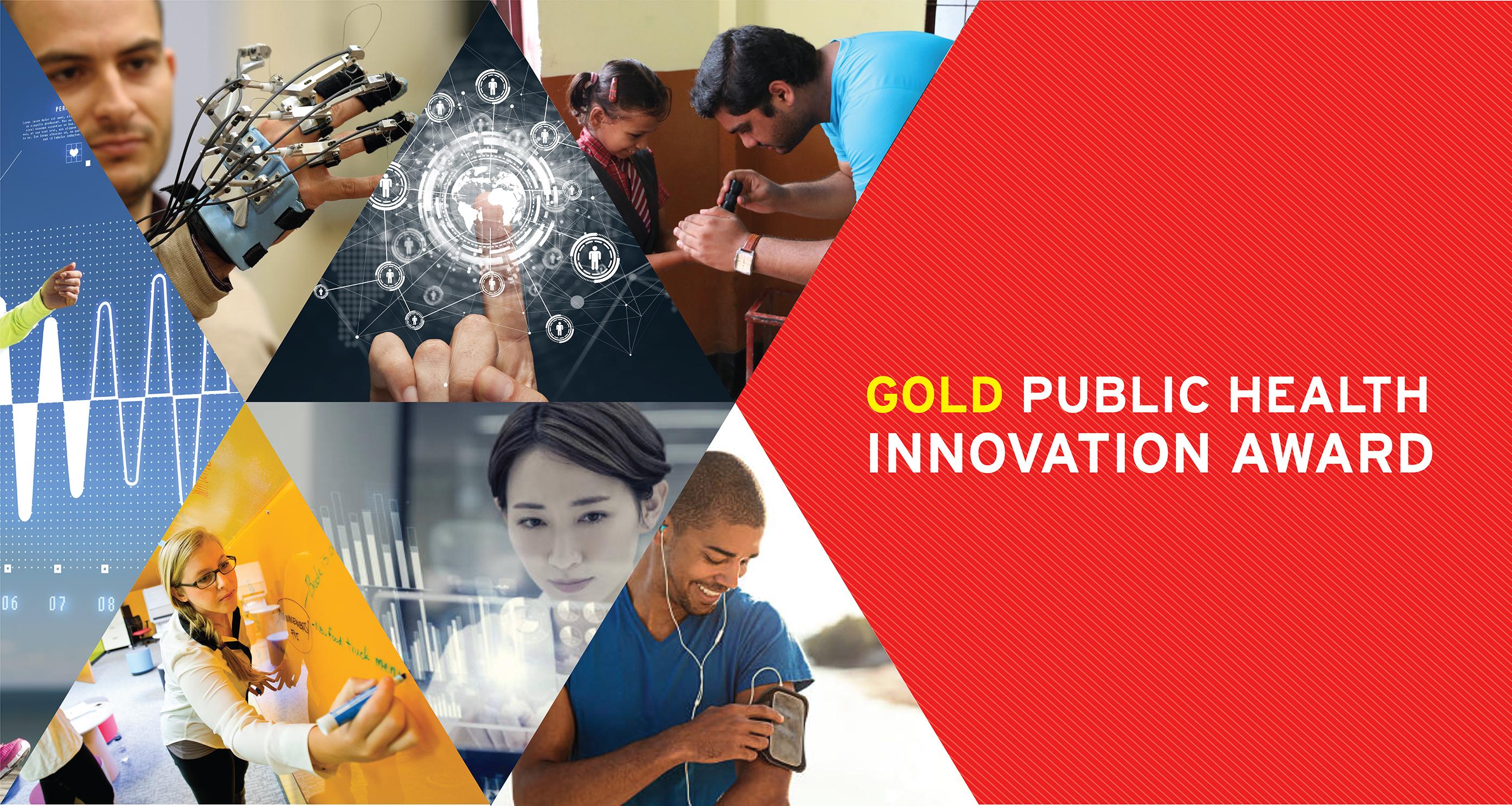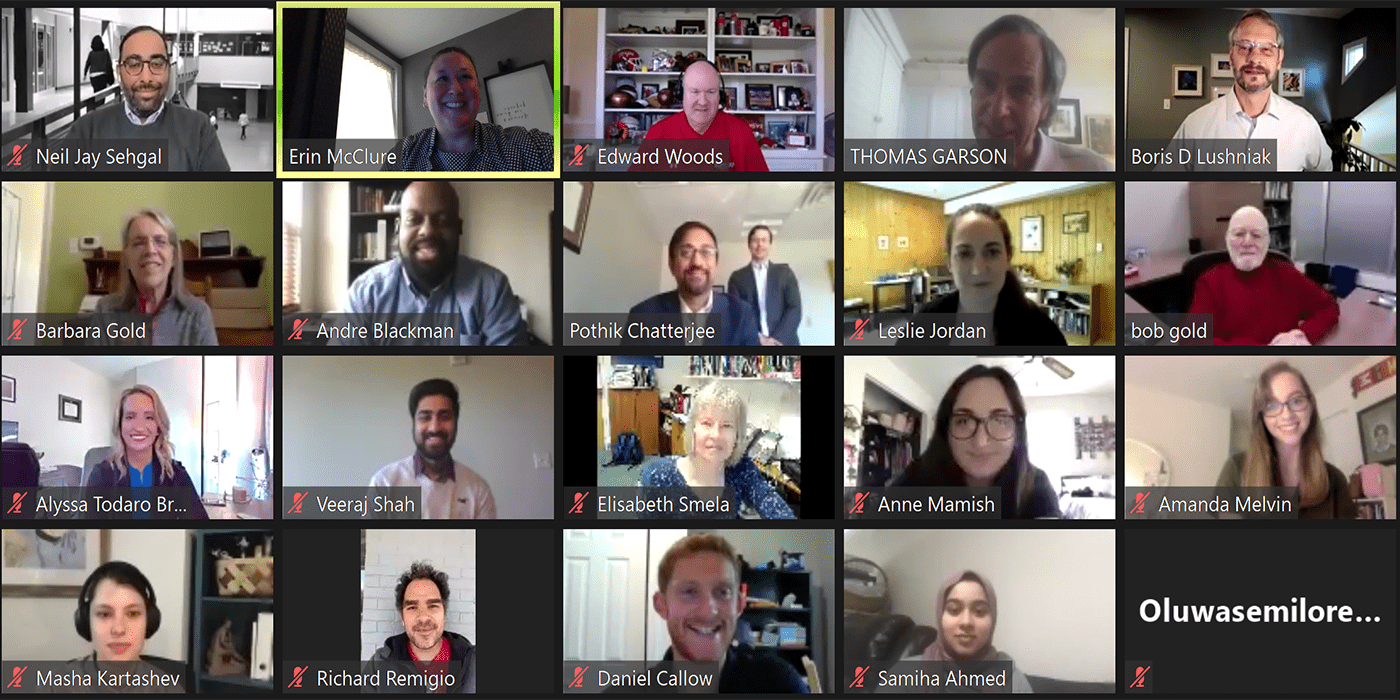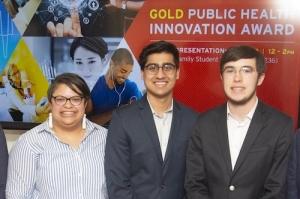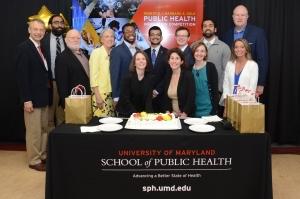
The Gold Public Health Innovation Award is the University of Maryland’s first award competition given to a team or individual for a creative solution to one of the world’s most complex public health issues. Launched in 2017 by Dr. Robert S. Gold (School of Public Health founding dean) and Barbara A. Gold and held annually, students can compete for up to $5,000 in start-up funding. Top student entrepreneurs deliver pitches to a panel of five thought leaders and health entrepreneurs who select the winner(s) each spring.
Successful proposals will describe a new, cutting edge approach to a public health problem. Solutions might relate to apps for digital health (therapeutics, wearable components, augmented virtual reality, interoperability between health systems, prosthetic advances, medical adherence, sensors technology, robotic nurses assistants, remote patient monitoring), innovative public health programs, policies/recommendations for policies, or other firsts within the public health field.
Undergraduate and graduate students in the UMD School of Public Health are eligible to apply. Team proposals are encouraged and teams may include students from across the University of Maryland.
The application cycle is currently closed.
Please contact sphgoldaward@gmail.com with any questions.
Past Winners
Resources
Visit the Innovation Gateway for resources for classes, programs, clubs, consulting groups, maker spaces, hackathons, accelerators, internships, mentors, pitch competitions, online networks, funding, and more.
Find a Mentor
Students are able to locate a mentor through our partnership with the Office of Technology Commercialization. Interested students should schedule appointments via http://go.umd.edu/EIR2019 and indicate "Gold Award" in their notes. See a list of Entrepreneurs in Residence at http://otc.umd.edu/startups/mentors
Find a Mentor Contact
Alla Corey McCoy, MBA'13
Director, Startup Support
acmccoy@umd.edu
Office of Technology Commercialization, University of Maryland
StartupUMD @ Diamondback Garage
Each team must meet the following requirements to compete in the Gold Public Health Innovation Award Competition:
Student Competitors: The competition is for undergraduate or graduate students currently enrolled on a full or part-time basis at the University of Maryland, College Park School of Public Health. You may be required to provide proof of enrollment, such as transcripts.
Team Composition: Non-students as well as non-School of Public Health students may be members of the venture’s founding/management team and may participate in planning the venture. However, only UMD students may compete (present the plan on-stage and answer questions from the competition judges). There is no restriction on the minimum or the maximum number of student competitors on a team pitching at the Gold Public Health Innovation Award, and no restriction on the total size of the venture’s founding team.
Student Involvement: The competition is for student-created and managed ventures, including new ventures launched by licensing university technology. Students are expected to:
- Be the driving force behind the innovation,
- Have played the primary role in developing the proposal, and
- Have key management roles in the innovation.
Nature of Ventures: Successful proposal applications for the award will describe new approaches to public health problems that are cutting-edge, such as apps for digital health, therapeutics, wearable components, augmented virtual reality, interoperability between health systems, artificial intelligence, web platforms, prosthetic advances, medical adherence, sensors technology, facial recognition software, robotic nurse assistants, remote patient monitoring and other firsts within the public health field. Licensing technologies from universities or research labs is encouraged, assuming they have not been commercialized previously.
The School of Public Health has the final decision on which teams are invited to compete in the Gold Public Health Innovation Award and reserves the right to include or exclude any teams for any reasons.
Attendance: To be considered for any award, all pitching (presenting) team members must arrive at the Gold Public Health Innovation Award Final/Competition at the scheduled arrival time. You must also attend all coaching sessions to be assigned at a later date.
Required Forms: Each team will be required to provide appropriate documentation to receive award payments which include W-9 and/or EIN forms. Prizes can only be awarded to legal entities, including individuals. In order to receive prize money, the venture must be a legally registered entity. No prizes will be awarded without the required forms submitted.
Please email your proposal application materials to sphgoldaward@gmail.com (link sends e-mail). Teams will be evaluated to compete based on their team eligibility and the quality of their proposal application.
Completing Your Application
You must complete an application for your team to be considered for the Gold Public Health Innovation Award. The application consists of a project narrative, abstract, and media materials. You may not submit multiple entries.
Project Narrative Guidelines
The project narrative must include the following:
- A clear description of the problem/issue being tackled.
- What makes this effort innovative?
- What impact does this have on public health or disease?
- What resources are required for the effort?
The narrative may be no more than 2 double-spaced pages using a minimum font size of 10 points.
Abstract Guidelines
The abstract should follow the below guidelines and format, and be emailed to sphgoldaward@gmail.com with the final application.
Abstract: 250-word maximum
Format: The abstract must be formatted to include problem, solution, innovation, based in evidence, expected impact, team, stage of idea, and your "ask". Please include the headers (i.e. problem, solution, innovation, based in evidence, expected impact, team, stage of idea, your "ask"). The headers do not count towards the word count.
Problem: Describe the problem that you are trying to solve.
Solution: What is your proposed innovative solution? Why is it important? How will it be implemented in the field?
Innovation: How is the idea new and innovative?
Based in Evidence: How is your solution evidence-based? Why will it work? This is very important criteria for evaluation.
Impact: This is the most important criteria for evaluation. In order to be accepted for presentation, the pitch must discuss the current or expected outcomes, and the abstract must also delineate how these outcomes are or will be measured.
Team: Who is leading the project? What expertise do you have in the space?
Describe Stage of Idea: What is your progress? How much work, if any, has been done to date? When was the idea initially developed?
Your "ask": Describe your current project/program development needs. How are you hoping to advance your program or idea by presenting a pitch?
Selection Criteria: The pitch abstract must exactly adhere to the above format, and all sections must be included. The pitch abstract will be evaluated based on the level of innovation, the expected impact and description of metrics, and the details that indicate that it is evidence-based and will be effective. The submission must be well-written and demonstrate thought and attention to detail. Avoid jargon and be sure that your audience understands exactly what you are proposing or describing.
Students may submit an optional draft abstract to sphgoldaward@gmail.com (link sends e-mail) for feedback prior to the final proposal application deadline.
Team Media Materials
Teams are required to submit materials that will be used in print, web, and other media including:
- Team Descriptions
- Team/Team member photos
- Product or prototype photos (if applicable)
The competition is intended to simulate the real-world process of entrepreneurs soliciting start-up funds from early-stage investors and venture capital firms. The judges function as early stage venture capital investors deciding on which innovation they would most likely fund. The quality of the idea, the size of the market, the competitive differentiation, the strength of the management team, and the clarity and persuasiveness of the written plan and oral presentation, all influence the judges’ decisions. Ultimately, the winning team should be the team in which the judges would most likely invest their money. Their ranking of the top teams is guided by the scorecard but should be consistent with the approach that would be used by early-stage venture capital or angel investor.
The judging panel consists of the following health entrepreneurs and/or thought leaders:
General Guidelines
Non-confidentiality: All sessions of the competition, including but not limited to oral presentations and question/answer sessions, are open to the public at large. Any and all of these sessions may be broadcast to interested persons through media which may include radio, television and the Internet. Any data or information discussed or divulged in public sessions by entrants should be considered information that could possibly enter the public realm, and entrants should not assume any right of confidentiality in any data or information discussed, divulged, or presented in these sessions.
Due to the nature of the competition, we are not able to ask judges, reviewers, staff, or the audience to agree to or sign non-disclosure statements. However, the School of Public Health, the organizer of the Gold Public Health Innovation Award, will make every effort to limit the distribution of business plans presented at the competition. The School of Public Health cannot guarantee that other individuals will not obtain access to electronic or hard copies of the business plan. All presentations are open to the general public, and some presentations may be videotaped.
Copyrights and Permissions: If a team uses copyrighted materials and/or images from a third-party in their submissions or presentations, they must obtain permission and authorization in advance from the owners to use this material.
Information presented by the competitor(s) at the Gold Public Health Innovation Award Competition is the sole responsibility of the competitor(s). The School of Public Health has not taken and does not intend to take, any steps to verify the adequacy, accuracy or completeness of any information, materials or statements presented by the competitor(s). The competitor(s), and not the School of Public Health, is responsible for ensuring the competitor(s) compliance with all applicable federal, state and other securities laws, and it is solely the competitor(s) responsibility to comply with any of such laws that are applicable.
Important Notices
Use of Competition Materials: The School of Public Health reserves the right to use any material prepared for the Gold Public Health Innovation Award in publicizing and promoting the event. The School of Public Health may use these materials in any printed materials and any 2020 Gold Public Health Innovation Award videotape or another medium that it may produce. The School of Public Health may videotape any portion of the Competition and utilize these tapes in any way that its sees fit.
Award winners are expected to be available for School of Public Health communication requests (e.g. project status updates, attendance at related competition events) for a period of two years after the award has been received.
Entry Fees: The Gold Public Health Innovation Award does not have an entry fee.
Changes to Competition Rules: While not anticipated, these rules and prizes are subject to change at the discretion of the School of Public Health at any time. The School of Public Health staff has the right to interpret these rules according to its own judgment.
Decisions regarding the Competition and the Winners: All decisions regarding the competition rules, procedures, and processes are at the sole discretion of the School of Public Health. Changes and/or interpretations of these rules may be made by the School of Public Health at any time, even though they may be (or may appear to be) in conflict with some previously published information. The selection of the teams to compete and the decision of the winners are at the sole discretion of the judges and the School of Public Health. Best efforts will be made to make decisions in accordance with this Official Rules document.


